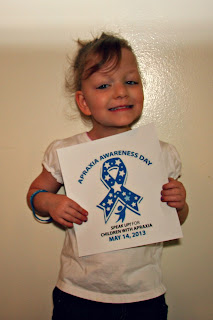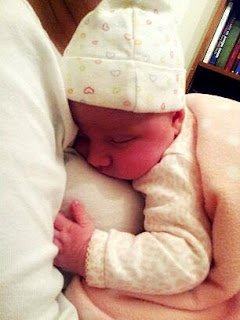'Let's Talk Tuesday' is a bi-weekly post series with ideas on how
you can help your child of any ability, but especially those with Apraxia,
Autism, speech disorders or late talkers. These are meant to be simple
ways to encourage speech. I am not a
speech therapist, but I am a mom of an Apraxic child, I am just sharing these
ideas in hopes that they will help someone else.
If you have a story or an idea that you would
like to share, please email me at [email protected].
Welcome to our first Let's Talk Tuesday! In the future on our Let's Talk Tuesday Series, I'll post different ideas on tips you can do with your child (of any ability) at home to encourage speech & language development. Today though, I thought a good place to start (with our first LTT post) would be to share our story of Apraxia with you. It may not
seem like much, but to us it's been an emotional journey & one that is
close to our hearts.
----------
My first daughter, Paige, was born with no major
problems. She was born at 38 weeks & only 5lbs 8oz. She was
incredibly tiny, but healthy. We were thrilled!
As she got a bit
older we noticed her eye lid's didn't seem to work normally & her actual
eye opening was extra small. After 3 surgeries on her eyes between the
ages of 11 months & 15 months, her eyes were corrected as much as possible
for the time being. Before her surgeries, she was starting to say a
couple of words... words only I could understand, but they were there.
After her surgeries, she stopped saying those words. It was really
odd to us. Right around the time we were realizing this was a concern of
ours, a study
came out that basically said
kids under the age of 2 that have more than 1 surgery are more likely to have
speech problems down the road.
My mommy gut told me that we needed to get some
professional help. I asked around to see what my options were & the
main one that came up was Early Intervention. I contacted a few until I
found our local Early Intervention program & scheduled an appointment.
They came to my house & did the evaluation. We started working
with them, & they were great. Paige was improving (slowly, but we
were thrilled with each hurdle nonetheless). At every doctor appointment,
Paige's speech was a concern, which would then lead us to another doctor
appointment with another specialist. I think in that year we went to
doctor appointments on average 3 times a month. It was a journey.
After about a year of working with them, one
of Paige's speech therapist mentioned that Paige might have something called
Apraxia. Honestly, I had no idea what that meant & it went in one ear
and out the other. Seriously, she said it & I heard it, but I didn't
register it.
One Sunday evening (a moment I will never forget), we were all in
the car on our way home from Rick's grandma's house. Earlier that day, Paige had learned how to say "Ma Ma"... I was so excited. At 19 months she finally could say what every mom wants to hear! Needless to say, it was a great day. As we were driving home that night, we talked about what we were going to do to get ready for bed when we got home. Paige then said... or rather, tried to say, "ba
ba" (for bottle), but it came out as "ma ma". It was evident what she was trying to say, but she
couldn't say her "b" sounds all of a sudden. She looked confused & tried over and
over to say it. She started to cry because she knew this was something she had worked
so hard on mastering & that she could say it before. At that moment I
knew there was more to her "speech delay" than just the anesthesia she had
over a year earlier. My husband worked with Paige to calm her down
while I turned around & cried. I didn't want her to see me crying, I
needed to be strong for her, but at that moment I wasn't. I just wanted
to pull over, scoop her up & hug her while we both cried. Just typing
out this moment still makes me cry.
The next morning I was still emotional about it, which gave me my
mamma bear fire. I was going to find out
what is really wrong with Paige's speech & what we could do to help her,
I was on a mission for my baby. I searched online, but didn't find
anything. I left messages for her speech therapist & her pediatrician
first thing in the morning to see if they could point me in the right
direction. By lunch time they had both called me & they both
mentioned that word again... Apraxia. It wasn't just a word any more.
This time it meant more. Not that I wasn't worried about Paige before,
but I just didn't understand it the first time, I guess. My mission was
progressing, I looked online for anything I could find for Apraxia & I
spoke more with her speech therapist at our next appointment.
I was told that Apraxia usually cannot be officially diagnosed
until the child is 3 years old & at that time Paige was 2. Our Early
Intervention speech therapist suggested we get a second opinion from a private speech therapist. After lots of research, I found a speech
therapist very close to us who specialized in Apraxia & she pre-diagnosed
Paige with it. Basically saying if she was old enough, she would be
diagnosed with it, but since she wasn't quite there yet, we'll say she has
about a 95% chance of having it. it's amazing that after searching for
about 12 long months, we finally found something that fit. Something
that, even though it's not easy, it's right & we had a direction to go
now.
It took Paige 6 long months & countless hours of practicing before she could say the "b" sound again, and even to this day she still struggles with it more often than not.
Just the other day Paige was officially
diagnosed with Apraxia (since she is 3 now) & Dyspraxia. The more I
learn about Apraxia, the more confident I am of this diagnosis for Paige. But
also, the more I learn about Apraxia & with each day that passes, the more
I realize how serious Apraxia is.
 |
| Paige on the first ever Apraxia Awareness Day |
Childhood Apraxia of Speech (CAS) is
considered a neurological speech disorder (or sometimes a motor planning
disorder) that affects the child's ability to clearly and correctly produce
syllables and words. The most obvious thing that others notice is that
the child has significantly limited and/or unclear speech. (source)
Apraxia is something that affects our
daily lives. Although I can usually understand what Paige is trying to
say (by picking out a word or two of her explanations), it takes a lot of
energy to listen so intently to her all day long, and no doubt it takes much
more energy on her part to try to coordinate her brain & what she wants to
say with her mouth. Most people have a much harder time understanding
her, of course. Sometimes I don't know if I should be happy or sad for her because she's come so far & done so well, but she still has such a long way to go.
Paige is amazing, though!
She has been very patient with herself & with others through this
whole process. She has also worked so
much harder than I would ever expect a 3 year old to work on something,
especially something that seems as simple as speech. She's always been positive about it & rarely gets frustrated.
 |
| Paige at Hippotherapy (speech therapy on horses) |
Even though Paige is in speech therapy, I do my best to have
little mini speech therapy sessions between the two of us so she can have that
extra little boost of help. All of our sweet kids (of all abilities) have so much
they want to say to us, so that's why I am starting Let's Talk Tuesdays, so we
can have give our kids every opportunity possible for them to have the tools
they need to express themselves. As parents we can make the biggest impact for our kids, so it's important for us to make every effort possible to encourage our kids.
For more information about Apraxia, click here.
For more information about Apraxia, click here.
I'd LOVE to hear your speech journey or speech tips that have
worked with your kids. Comment with them
below or email me at [email protected]










